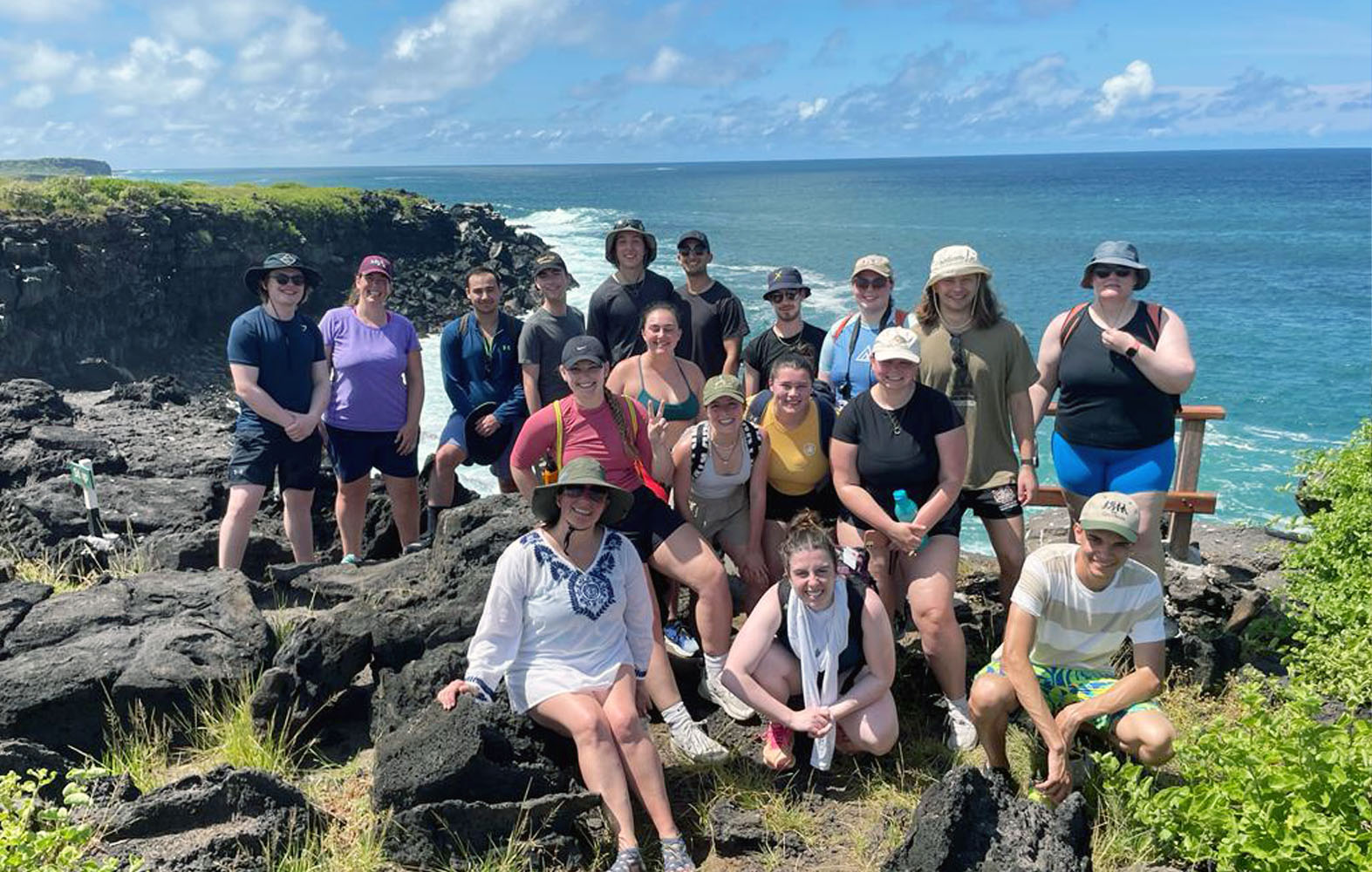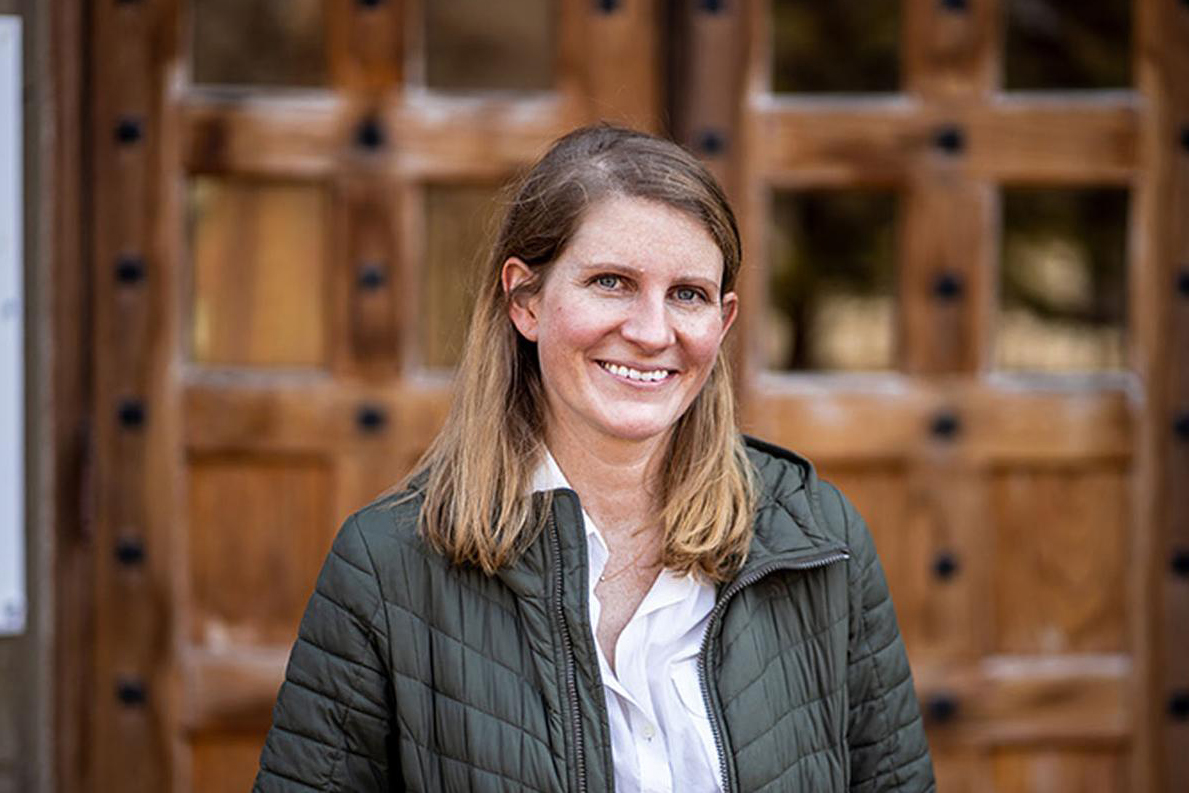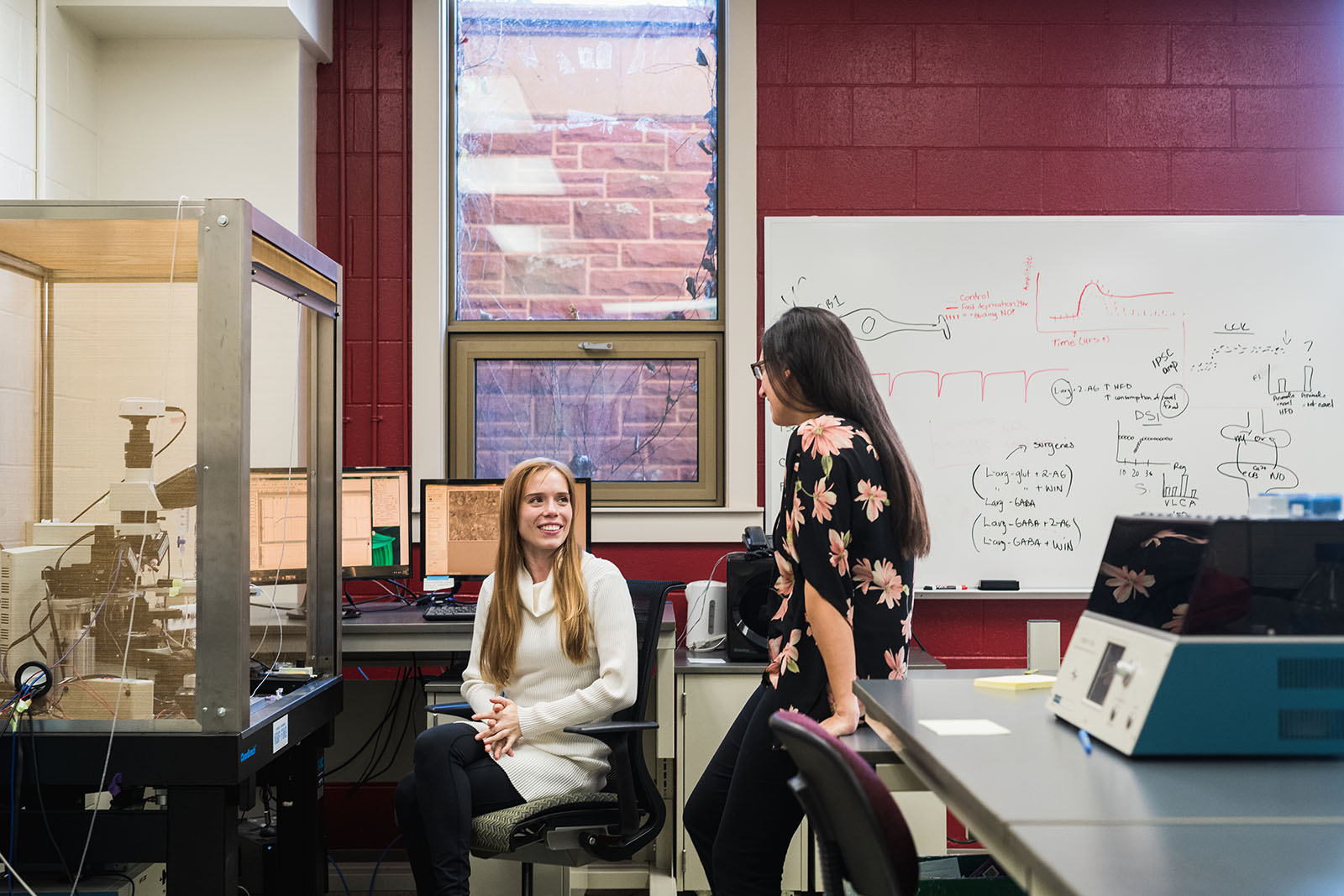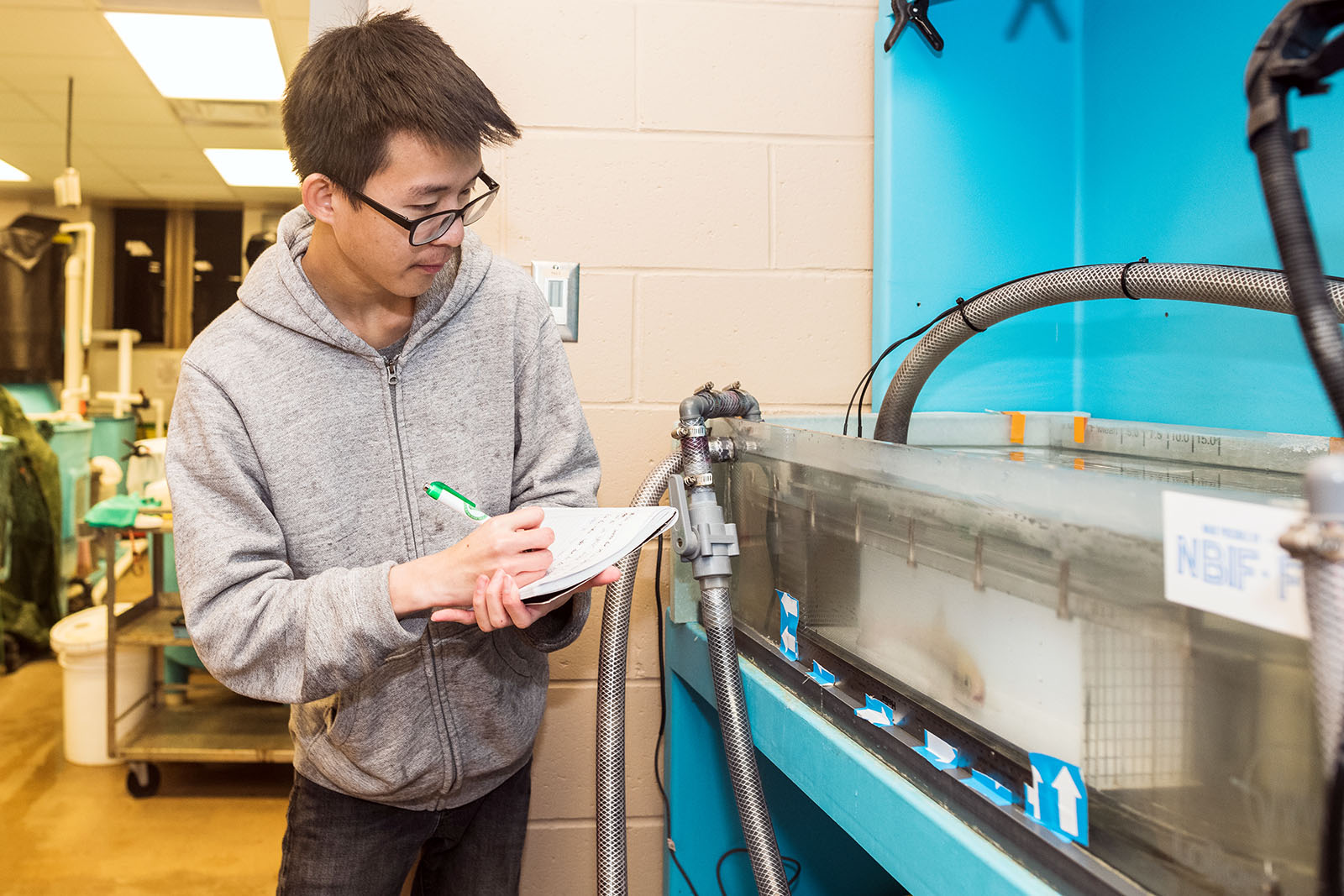Overview
Disciplines include cell biology, ecology, genetics and evolution, and animal and plant diversity.
Mount Allison's Biology program was named among the top 20 biology programs in Canada. — Maclean's 2020 University Rankings
At a Glance
Curriculum
At Mount Allison, Biology provides students with opportunities for hands-on learning, including research and laboratory experience.
First-year courses include studies of introductory organismal and cell biology, as well as biochemistry. In second year, material divides into ecology, genetics and evolution, statistics, and a series of form and function courses.
Upper-year courses allow students to explore topics such as:
- marine biology
- aquaculture
- developmental biology
- applied genetics
- environmental microbiology
- ornithology
- animal and human physiology
- applied and theoretical ecology
Biology is available as:
- BSc major (60 credits)
- BSc honours (75 credits)
- Minor in any degree (24 credits)
Not sure about the difference between a major, a minor, an honours, and a certificate?
Master of Science (MSc) in Biology — our Master of Science program offers the opportunity to pursue a Master's degree in a small, intimate environment.

Related programs:
BIOL 1001 — Foundations of Biology
This course introduces the fundamentals of organismal biology: the scientific method, principles of evolution including Darwin's theory of natural selection, adaptations in organismal form and function, biodiversity, the interactions of organisms with their environment, and the practices of scientific communication. (Format: Lecture 3 Hours, Laboratory 3 Hours)
BIOL 1501 — Cell Biology
This course introduces the structure, organization and functions of the cell, which is the fundamental structural and functional unit of living organisms. It places particular emphasis on eukaryotic cells. Topics include: membranes and organelles, communication within and between cells, membrane transport, the cell cycle, meiosis and mitosis. (Format: Lecture 3 Hours, Laboratory 3 Hours)
BIOL 2101 — Introduction to Ecology
This course introduces current concepts of population and community ecology using local ecosystems and organisms, principally aquatic insects, whenever possible. (Format: Lecture 3 Hours, Laboratory 3 Hours)
BIOL 2811 — Genetics and Evolution
This course examines evolution by natural selection as the driving force behind the diversity of life, examining genetic and evolutionary processes from the level of cells (gene transcription, recombination, mutation) to populations (selection, migration, genetic drift) to species (speciation, extinction, constraint). It examines modern theories of biological evolution, building from Mendelian genetics to genomics, and presents evolutionary biology as an experimental science, emphasizing the methods used to test evolutionary hypotheses in the wild and in the lab. It uses viruses, bacteria, and eukaryotes of various levels of complexity as examples both in lectures and laboratories. (Format: Lecture 3 Hours, Laboratory 3 Hours)
BIOL 3221 — Human Anatomy
This course examines the structural organization of the human body, including the integumentary, skeletal, muscular, nervous, endocrine, cardiovascular, respiratory, digestive, urinary, and reproductive systems. It investigates these systems in the context of human health and disease.
BIOL 3361 — Coastal Marine Biology
This course investigates the ecology of estuarine, intertidal, and subtidal ecosystems with a particular focus on ecosystems within Atlantic Canada. Fundamental aspects of marine science will be covered to highlight the physical, geological, and chemical processes that shape coastal ecosystems. Building from these fundamentals, students will explore the community ecology, food webs, and biodiversity of the major types of coastal ecosystems. [Note: The course includes a required field trip to the Huntsman Marine Sciences Centre in St. Andrews, N.B.] (Format: Lecture 3 Hours, Field Trip)
BIOL 3811 — Conservation Biology
The field of conservation biology applies to the principles of ecology, biogeography, and population genetics to the mitigation of human impact and the maintenance of global biodiversity. The course will familiarize the student with the concepts and principles of conservation biology and will encourage active debate about threats to ecological integrity and the ways scientists attempt to cope with such threats.
BIOL 4311 — Neurophysiology
This course investigates advanced topics in neurophysiology including neuro- and glio-transmission, the physiology and plasticity of synapses, and neuronal circuits that underlie behaviour. It also discusses the development and pathophysiology of the nervous system.
Find a full list of biology courses in our Academic Calendar — Biology.

Faculty Spotlight
Dr. Emily Austen
Assistant Professor, Biology
Careers
Whether you're entering the job market or continuing your education, your Mount Allison degree will stand out.
Mount Allison has been recognized by Maclean's as the top primarily undergraduate university in Canada more times than any other university.
With experiential learning and career development opportunities available in every degree, you'll also graduate with hands-on learning and real-world experience.
Our graduates also boast extraordinarily high acceptance rates to top graduate programs and professional schools such as law and medicine.
Popular career paths for Biology graduates include:
- medical professional
- health policy analyst
- medical researcher
- zoologist/veterinarian
- epidemiologist
- wildlife/aquatic biologist
- environmental biologist
- microbiologist
- government research scientist
- education professional
Alumni Spotlight
Sally Carson ('84)
Bachelor of Science, Biology
Marine biologist and Director, NZ Marine Studies Centre, University of Otago, New Zealand
» Sally Carson (’84) protects New Zealand coastline and supports citizen scientists

Testimonials

As a biology student, the program really allowed me to get involved in research early on and develop valuable skills through various teaching assistant positions, conference presentations, and designing my own honours project. MtA is the right place for you if you're looking to gain unique experiences and opportunities that will make you stand out when applying to graduate programs or entering the job market.

The biology program at Mount Allison provided me with complex physiology research experience for my future career as a physician, and a great community of students, faculty, and researchers. The small community here provided me with great opportunities to personally connect with researchers within the program, conduct independent research, and present it at conferences. I would recommend the biology program at Mount Allison to any new students interested in pursuing medicine or research!
Extras

Research opportunities
Faculty are actively involved in research, and there are many opportunities for undergraduate students to participate in research through faculty-supervised independent research projects during summers or during academic terms.
Students who are seriously interested in advanced studies are given the opportunity to explore the areas of interests to faculty who are primarily concerned with the fields of ecology and physiology.
Research opportunities in Biology include:
- phytoplankton physiology and ecology
- neurophysiology
- environmental animal physiology
- fish ecology
- molecular genetics
- marine botany
- field ecology
- ornithology

Facilities
The Harold Crabtree Aqualab: Centre for Aquatic Sciences
The Aqualab is a state-of-the art aquatic facility marrying field-based aquatic research with lab-based studies reflecting real-world environmental conditions. The Aqualab provides a fertile training facility for students, faculty, and visiting scientists.
Digital Microscopy Facility
The Digital Microscopy Facility (DMF) houses microscopy and microanalysis instrumentation which is available for use by faculty and students, and includes a scanning electron microscope, an energy dispersive spectrometry (EDS) system, and a 3D printer, among other equipment.
Environmental Analysis and Stable Isotope Laboratory
The Environmental Analysis and Stable Isotope Laboratory (EASIL) hosts a growing suite of instrumentation for quantitative analyses of environmental processes. The facility personnel have expertise in compositional analyses of a wide range of biological and environmental samples, from bird feathers to mudflat sediment.
/current-students/department-biology
Admission Requirements
Academic Awards
Mount A is #2 in student awards
Maclean’s ranks Mount Allison second in student and faculty awards in its latest University Rankings. To date, 56 Mount Allison students have become Rhodes Scholars — one of the best per capita records in Canada.


